The best in poetry (and poetic things), this week with Seth Haines.
1 Art
My grandfather used to say “the world is your canvas, ” which I always found odd because even the canvas was not my canvas, being that I was a miserable artist. Expressions aside, I am pleased to introduce you to a group of artists who have decided to take my grandfather’s advice literally. And if you are a New Yorker, you may want to travel to the Williamsburg neighborhood of Brooklyn and take a gander at their work in the exhibit entitled In Plain Sight. The exhibit features works which are prominently displayed on the sides of neighborhood walls, in alleyways, and on sidewalks. And what’s more, the artists place signs by their works to shed a little light on their street art. How long will the exhibit last? Until the elements prevail, I suppose.
And speaking of the elements, check out this incredible list of art installations that imitate weather. An indoor Rain Room that purports to keep you dry? Artificially produced indoor clouds? These are just a few of the works you’ll see in this slideshow by Flavorwire.
2 News
War—that infernal battle of man versus man. Each of us has strong opinions regarding the particulars of war, the nature of it, and its efficacy. But regardless of our politics, philosophies, or ideologies, we all remember the men and women who have given their lives in honor of our country. And hopefully, we remember them well.
This week we celebrated Veteran’s Day, and as I was driving to the office on Monday I heard a fascinating report on NPR. The piece featured the poets of World War I—the war to end all wars. British poet Laurence Binyon’s poem, “For the Fallen, ” was highlighted.
They shall grow not old, as we that are left grow old:
Age shall not weary them, nor the years condemn.
At the going down of the sun and in the morning
We will remember them.
If you have a few moments you can listen to the audio of the broadcast.
3 Publishing
“There are certainly signs that the timing may be perfect for a poetry revival…” writes Kamila Kocialkowska of the New Statesman. In her piece, Kocialkowska highlights the United Kingdom’s Poet Laureate, Carol Ann Duffy, who’s promoting programs to revive contemporary poetry. And maybe the time is right. After all, “[d]espite the threat which the digital age has posed to the publishing industry as a whole, the web has, in many ways, provided fertile ground for the spread of poetry.”
Fertile ground, indeed. We here at Tweetspeak can attest to that.
And in this fertile ground, Norton has relaunched Liverlight & Company, the publishing company known for publishing works by the likes of E.E. Cummings and T.S. Eliot. In June of 2013, Liverlight will begin publishing poetry again, this time by poet Adam Fitzgerald. You can read more about Liverlight and Fitzgerald’s upcoming book in this article at Publisher’s Weekly.
4 Poetry at Work
Are you a budding poet, writer, or artist? Then you know how difficult it can be to make a living employing your craft. That’s why most of us hold down the day shift. After all, we have food to buy, the rent to pay, and medical insurance to maintain.
Lucky for those of us who fancy ourselves as artist, the workplace can be an endless source of material. Need proof? Check out this article at poets.org, which examines various poems about the workplace.
Poetry Foundation also has a handy list of Work Poems, featuring pieces by Carl Sandburg, Walt Whitman, Elizabeth Bishop, and others. Read a few of the pieces there, then pen your own workplace poem. Explore the joy, anger, frustration, or elation in your chosen profession. Capture the essence of your employment or the economic realities of your daily life. Share it with us in the comments or tweet it to our local Poetry at Work expert, Glynn Young. Perhaps you can cajole him into tweeting it to the world!
5 Creativity
Do you avoid engaging in new, creative pastimes? Do you limit yourself, participating only in activities where you know you’ll be considered a success? If so, you might be stifling your potential for greatness. This article at 99u discusses the work by Heidi Grant Halvorson, PhD, who postulates that confining yourself to activities where there is the likelihood of success may drive you to make more mistakes in those endeavors, and may also limit creative shifts that allow for personal growth and development. The solution? Read this piece for more on how to grow in your “get-better” goals.
And speaking of get-better goals, are you stretching yourself in creative writing? If not, perhaps we have just the thing for you. Each week Tweetspeak offers a themed poetry writing prompt. This month’s theme is “surrealism, ” and the prompt for the week involves The Treachery of Images. Stretch the limits of your creativity and come play with us. You’ll love it! I promise.
6 Write-It
I stumbled across this writing contest, and it was just too much for this southern gent. Are you a poet, playwright, or fiction writer? Do you love po’boys, Abita beer, and jazz? Then you should enter the writing contest at the Tennessee Williams/New Orleans Literary Festival. The venue is among my favorite cities in the world, and the winner of each contest will receive a cash prize and passes to the festival.
And if you choose to enter the contest, remember,
“[i]f the writing is honest it cannot be separated from the man who wrote it.” –Tennessee Williams.
7 Poems
In the spirit of poetry at work, we’re highlighting poems about occupation here at This Week’s Top Ten Poetic Picks. I love both of the featured pieces today and hope that you’ll give them a careful reading.
In Chicago, Carl Sandburg creates an intensely human portrait of the city and its working class. He writes:
Laughing the stormy, husky, brawling laughter of Youth, half-naked, sweating, proud
to be Hog Butcher, Tool Maker, Stacker of Wheat, Player with Railroads and Freight
Handler to the Nation.
In his poem What Work Is, Philip Levine explores the thoughts of a man waiting in an employment line in Detroit. He balances the angst of unemployment with the tenderness of family. Levine opens his poem:
We stand in the rain in a long line
waiting at Ford Highland Park. For work.
You know what work is—if you’re
old enough to read this you know what
work is, although you may not do it.
Forget you. This is about waiting,
shifting from one foot to another.
For the complete works of each of these poems, follow the links above.
8 People
Poet Jack Gilbert passed Tuesday at the age of 87. Living in an assisted-care home for three years, the Pulitzer Prize nominee suffered from dementia in the later years of his life. The Los Angeles Times brings this touching piece about the last days of Mr. Gilbert.
You can find selected works of Gilbert at the Poetry Foundation. Works like the beautiful What is There to Say, in which Gilbert writes:
What do they say each new morning
in heaven? They would
weary of one always
singing how green the
green trees are in
Paradise.
Surely it would seem convention
and affectation
to rejoice every time
Helen went by, since
she would have gone
daily by.
9 Books
What are the books that directed the course of your life, the ones that helped shape your ideals? To Kill a Mockingbird? The Complete Short Stories of Flannery O’Connor? In 2007, artist Jane Mount began painting portraits of fascinating individuals using nothing more than the spines of the books that most influenced them. These book-spine portraits featured in My Ideal Bookshelf became abstract representations of the people and their influences. Check out this piece at Brainpickings for more on the work of Jane Mount.
10 Sound n Motion
Today I leave you with a clip of Carl Sandburg, author of the inimitable poem “Chicago” (as cited above), on a 1960s game show. What a juxtaposition, this man who wrote of the “stormy, husky, brawling laughter of Youth, ” squeaking his “yeps” and “nopes” in the hopes of fooling the panel. Watch to the end to see his stunning presidential prediction (which I believe references the showdown between Kennedy and Nixon).
Cover photo by William Neuheisel, Creative Commons, via Flickr. Article photos by Claire Burge. Used with permission. Post by Seth Haines.
__________________
Buy a year of Every Day Poems, just $2.99— Read a poem a day, become a better writer. In November we’re exploring the theme Surrealism.
- Become a Better Writer: Fly Fishing Artist Date - June 6, 2014
- No Cat Poetry for Fierce Dog Lovers - November 22, 2013
- Exploring Poetry: Penning a Ghazal - October 18, 2013
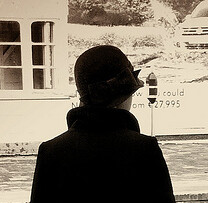
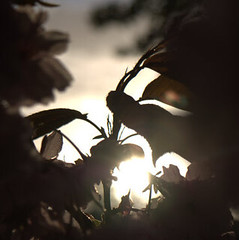
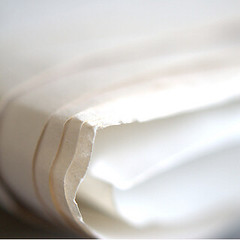

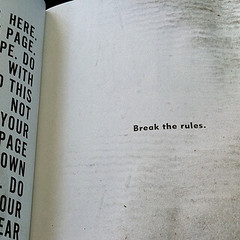
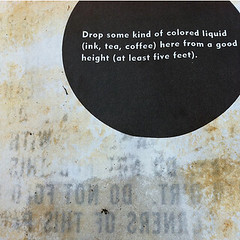

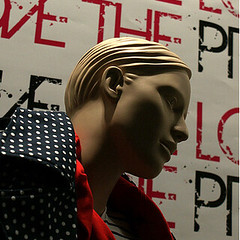



Leave a Reply